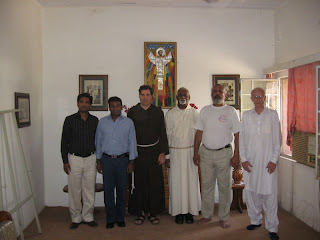 The Vice Province of Pakistan had its beginnings over 150 years ago when the British Army invited Capuchins to serve as military chaplains in India. The original Italian missionaries were soon replaced by friars from France. Later, in the 1880’s, the French Capuchins were replaced by friars from Belgium. Today there are about 40 friars in the Vice Province, of whom three are from Belgium while the rest are Pakistanis. They are involved primarily in parochial ministry, although they also run a few schools.
The Vice Province of Pakistan had its beginnings over 150 years ago when the British Army invited Capuchins to serve as military chaplains in India. The original Italian missionaries were soon replaced by friars from France. Later, in the 1880’s, the French Capuchins were replaced by friars from Belgium. Today there are about 40 friars in the Vice Province, of whom three are from Belgium while the rest are Pakistanis. They are involved primarily in parochial ministry, although they also run a few schools. Although priests and religious have rarely been specifically targeted by extremists in Pakistan, they share the plight of all Pakistanis. A bomb planted by a terrorist group outside a police training center last March blew out the windows and splintered several doors in one of the friaries in Lahore. Beyond the dangers caused by frequent bomb blasts and gun battles between the military and the extremists, the friars share additional difficulties with the rest of the Christian community in the country. Christians account for only 3% of the population in Pakistan, and they are often looked upon as outsiders. Various attempts to “Islamicize” the country have made their situation even more perilous. Officially, Christians (as all minorities) are tolerated and even protected. Clearly, however, minority groups do not enjoy equal rights. The clearest example of this disparity is the country’s blasphemy laws. The effects of these laws was made clear in a recent case.
In one of the villages where the friars minister, a young Christian man befriended a Muslim girl. There was nothing unusual in this since interreligious marriages are not uncommon in Pakistan. At some point, the relationship was broken off, which apparently displeased the parents of the girl. They exacted their revenge by accusing him of blasphemy. The local police arrested the young man, and threw him into a jail cell with a group of Muslim prisoners. These prisoners began to beat the young man mercilessly. He was then taken to a solitary cell, where the police continued to torture him. Eventually, they strangled him to death. According to the official police report, the young man hung himself, but the autopsy clearly showed marks that were inconsistent with hanging. Despite clear evidence of police brutality leading to death, nothing will be done to discipline them. Another false accusation of blasphemy in Gorja, Pakistan, culminated with a mob torching the houses of several Christian families. Such cases are common enough that even some Muslims are calling for the abolition of blasphemy laws.
The unequal treatment of Christians is also seen in employment opportunities. Christians are often trapped in low-paying jobs, with few opportunities for advancement. Christian children are treated with such contempt in the public schools that many will not attend school at all unless there is a Catholic school nearby. In this way, the cycle of poverty is continued.
 While the situation may seem bleak, our brothers in Pakistan are working diligently to improve the lives of Christians in the country. One of the brothers works extensively in the area of interreligious dialogue. It is a work that requires great patience since progress comes in small, slow steps. The brothers have also opened many schools, both in the cities and in the villages. Through education, they are slowly improving the lives of the poor and helping to eradicate an extremism that preys on ignorance. Through their work in the parishes, they help the parishioners to strengthen the sense of community and interdependence among the Catholic community. One might say that the primary ministry of the Vice Province is one of providing hope to the people of Pakistan.
While the situation may seem bleak, our brothers in Pakistan are working diligently to improve the lives of Christians in the country. One of the brothers works extensively in the area of interreligious dialogue. It is a work that requires great patience since progress comes in small, slow steps. The brothers have also opened many schools, both in the cities and in the villages. Through education, they are slowly improving the lives of the poor and helping to eradicate an extremism that preys on ignorance. Through their work in the parishes, they help the parishioners to strengthen the sense of community and interdependence among the Catholic community. One might say that the primary ministry of the Vice Province is one of providing hope to the people of Pakistan.
No comments:
Post a Comment